Detailed description and advice of agronomists on potato varieties: "Petersburg", "Barin", "Leader" and others
There are over 4000 varieties of potatoes. Tubers differ in shape, size, color, pulp shade, starchiness and other parameters. The timing of the ripening of the potatoes and the density of the pulp, which is responsible for the ability to boil, are important.
We recommend that lovers of mashed potatoes pay special attention to varieties with white pulp - they will be discussed in the article.
The content of the article
Description of varieties
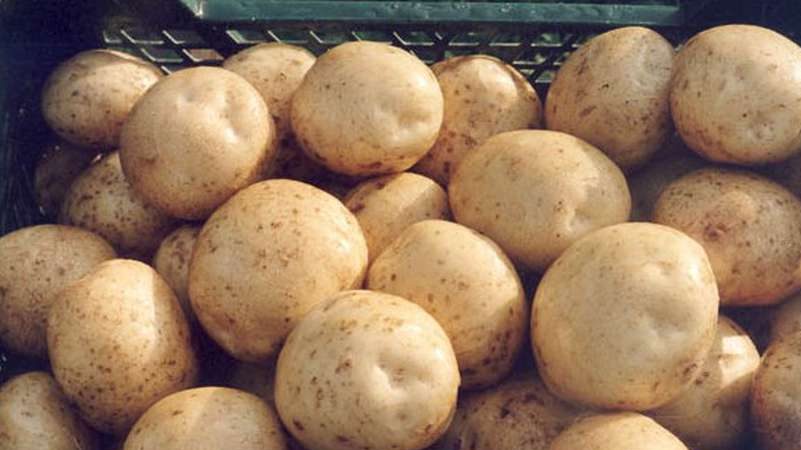
It is believed that long ripening increases the starch content of the tubers, and therefore tastes better. Ultra-early varieties have a less intense potato flavor than mid-late and late varieties.
White pulp indicates a high content of starch and vitamin C. Such tubers boil better, they are more juicy, among them St. Petersburg, Silvanu and Leader are distinguished.
Interesting! Small and medium-sized potato tubers contain more nutrients than large ones.
White tubers with white flesh are considered the most popular for making mashed potatoes; such a dish will be crumbly, tender and tasty. It is better to use varieties such as Barin, Lakomka and Milena.
Difference from other varieties
First of all, these varieties are distinguished by the presence of white pulp, which provides better digestibility and a mild taste of mashed potatoes. A large amount of starch gives the tubers a special taste, which varies among varieties:
- Barin - has a beige skin and light pulp, starch content reaches 15%, the taste is sweet and delicate.
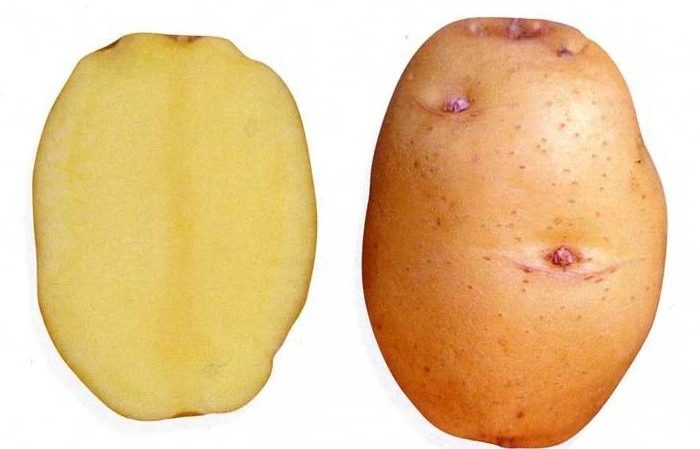
- Leader - characteristic yellow hue of the peel and white pulp, the taste is highly appreciated.
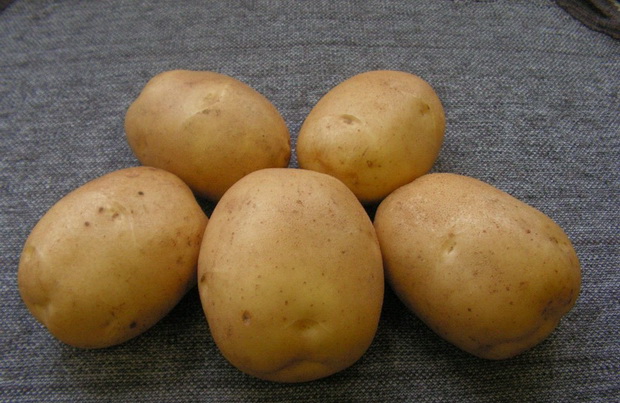
- Petersburg - mid-season table variety with white flesh and skin, not prone to darkening during cooking.

- Milena - ultra-early potatoes, not boiled soft, the skin is yellow, and the pulp is creamy.
- Timo - smooth potato peel has a yellowish tint, light pulp with good taste, starch content up to 14%.
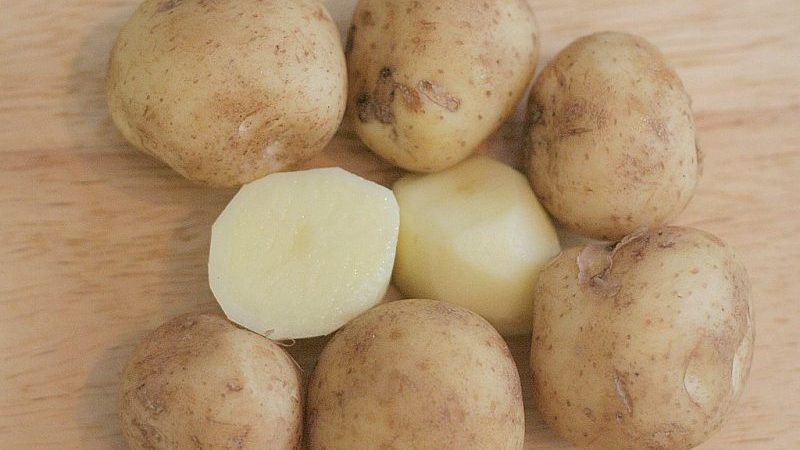
- Gourmet - the taste of this variety is highly appreciated. Characteristic features are medium early ripening, smooth yellow rind and white flesh.
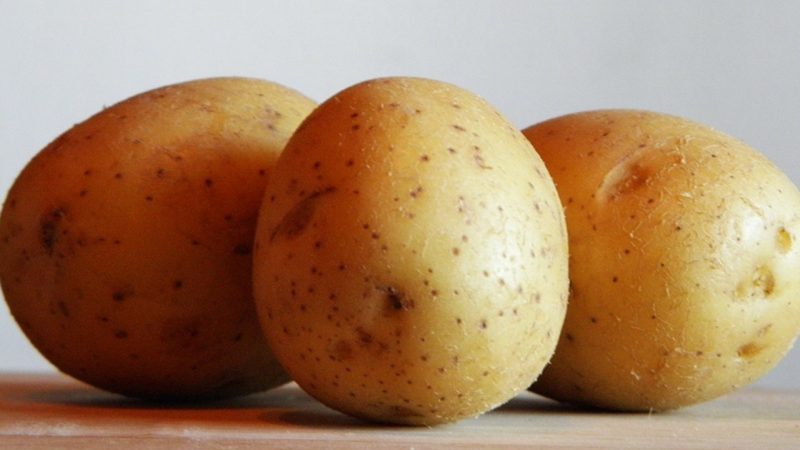
In addition, there are a number of varieties with white pulp, which differ in the color of the skin - red, pink, yellow and purple, as well as shades of eyes.
Among them are such famous varieties:
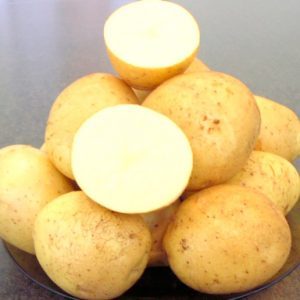
All varieties of white-fleshed potatoes have a high nutritional value and contain a large amount of vitamins and microelements.
Chemical composition, trace elements and vitamins
It is in varieties of potatoes with white flesh that a large amount of valuable plant protein tuberin is contained. They also differ in their high content of vitamins C, A, E, K, B and H.
The presence of acids such as nicotinic, malic and oxalic make potatoes an assistant in diseases of the heart and blood vessels. Pantothenic acid and citric acid will help fight kidney disease.
Tuber characteristics and yield
Depending on the variety, the size and surface of the tubers may differ, as well as their number under one bush:
- The leader has the correct shape of tubers, oval with thin skin, smooth. The highest yield indicator is 340 c / ha.
- Petersburg potatoes are distinguished by a flat tuber top, the surface is smooth. Up to 4 kg of potatoes can be harvested from one bush.
- Milena ripens early, tubers are large, round. The maximum yield is 600 c / ha.
- Gourmand is an ultra-early variety with round potatoes. Collect up to 369 c / ha.
Most potatoes grow medium to large in size, the yield of varieties with white pulp is high, and the quality of the pulp and taste are always at their best.
Growing region and planting dates
It is believed that potatoes are best grown in central Russia, this climate is most suitable for the plant. In the southern regions, as in the northern ones, the quality and quantity of vitamins and microelements will differ. As a rule, they decrease due to too hot or cold climate, the number of sunny days.
Potatoes are planted in early May, but depending on the region, the dates may shift. The further south the edge, the earlier the tubers are planted and the earlier they are harvested.... In the northern regions, potatoes are planted only after the onset of stable heat, when the soil warms up from + 10 ° C and above.
The main advantages and disadvantages of varieties
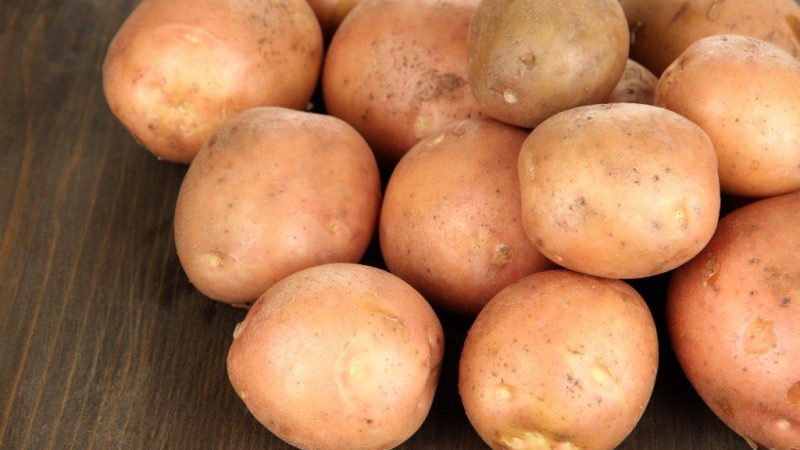
The advantages and disadvantages of white potatoes may differ depending on the variety, but there is a perception that tubers with white skin are less mature. As a rule, their skin is thin and does not withstand long storage... But white potatoes with colored peels or eyes are considered the best for winter use, they can last until spring.
Potatoes of the Sineglazka or Golubizna varieties have more starch, their white pulp is boiled, the tubers are nourishing, and the main purpose is to make mashed potatoes. The yellowish pulp of varieties such as Timo, Rosara or Fresca contains more carotene than other tubers.
Reference! The high starch content of white potatoes makes them an unwanted guest on the table for overweight people.
It is difficult to highlight common features in white potato varieties, but each individually has certain advantages and disadvantages:
- Petersburg when grown, it is prone to various diseases, keeping quality is average, but high yield and mid-early ripening satisfy many gardeners. Tubers have a universal purpose.
- White Swan differs in low taste and average keeping quality, it has low resistance to frost and high requirements for soil, but the yield is record - up to 10 kg per bush.
- Leader famous for its large potatoes and high yield, while it has excellent taste and ease of care.
- Barin has good taste, is adapted to long-term storage, ripens early and grows on almost any land. It is prone to attack by a nematode and is prone to scab disease.
- Timo Hankkiyan has a high resistance to sudden changes in temperatures, it can easily endure frost and extreme heat, rarely gets sick, and ripens early. It has a high taste, but the marketability of this variety is average.
- Gourmet - early variety, unpretentious in care, average yield, and high taste.
- Sylvanas gives an average yield with high marketability, and keeping quality reaches 90%, is resistant to most diseases and has a pleasant taste.
- Milena - unpretentious variety, gives a consistently high yield, has a good taste, is able to adapt to the climate and soil.
Most white potato varieties can be grown not only with tubers, but also with seeds, which makes them even more popular among hobbyists and professionals.
Features of planting and growing varieties
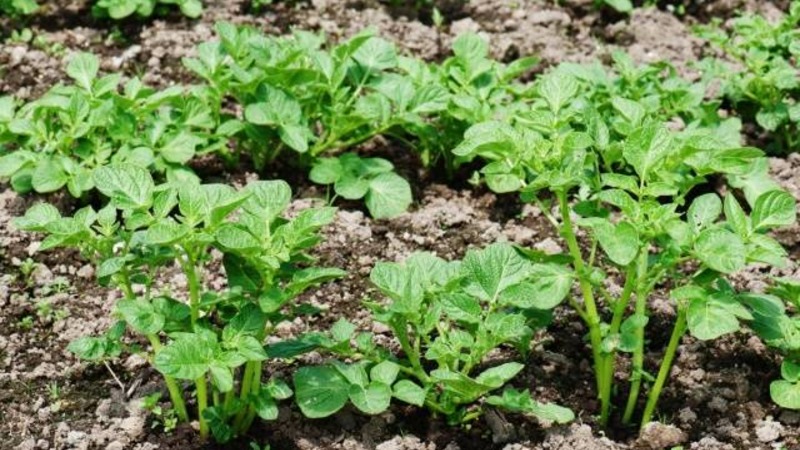
For planting, choose strong medium-sized tubers. They are selected when harvesting in the fall - it is best to take potatoes from the most productive bushes.When planting, the potato can be cut into pieces so that each of them contains a sprout, so with a small amount of planting material it will be possible to grow a larger crop.
Reference! Cut potatoes are treated with wood ash and slightly dried in the sun.
Many varieties are planted with seeds or individual shoots, which also gives a fairly high yield. Seed potatoes are harvested in dry weather, with additional drying in the sun. Store in a cool, dark place, and before planting, take out into the air for 15 days.
Any potato requires a lot of light, most varieties do not tolerate drought, for example, Milena, and therefore it is worth controlling soil moisture. At the same time, excess moisture will kill the culture - it will simply rot in the ground.
In most cases, the agricultural technology for caring for white potato varieties is standard, with rare exceptions. It is important to fertilize the plant, water it and protect it from diseases and pests.
Harvesting and storing white pulp varieties
Harvested potatoes with white flesh, depending on the variety and its ripening time. There are early varieties - such as: Milena, Leader, Timo and Lakomka. The Petersburg variety, Barin and Silvana are considered mid-season.
How and when to collect
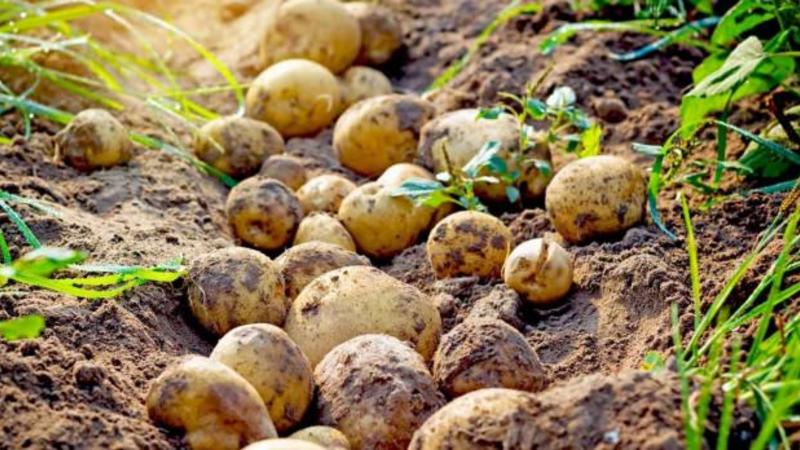
The crop is harvested when the tops turn yellow and lie down. A week before harvesting, it is advisable to remove it from the garden, and schedule the harvest on a dry, fine day. After digging up, the potatoes are laid out in a shaded place to dry. If the tubers are immediately selected for planting next year, then, on the contrary, they are placed in a sunny place.
If the collection is done manually, take into account how the planted variety grows. There are crops that grow wider, and there are potatoes that go deeper into the ground. Depending on this, the width of the soil coverage around the bush is adjusted. To reduce the amount of potatoes cut with a shovel, use a pitchfork to dig.
Storage features and keeping quality of the variety
Store potatoes for food and landing, in a cool dry place. It is important to periodically sort out and discard rotten and spoiled specimens, otherwise the entire crop will be spoiled and will not survive until spring.
It is best to store any type of potato, including white, in wooden boxes with sparsely stuffed slats for air circulation. This will reduce spoilage of the potatoes. Keeping quality will depend on the frequency of revision of the crop, the timely removal of diseased specimens, as well as the variety of potatoes.
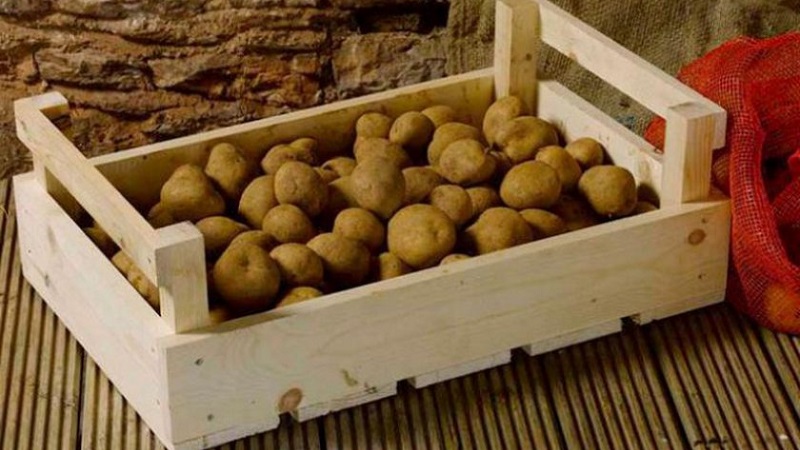
What can be the difficulties in growing
The most common problems when growing potatoes:
- planting too early - the material is frozen;
- excess moisture - potatoes are sick or rotten;
- lack of moisture - potatoes gave a small crop and few tubers, underdeveloped;
- lack of prevention of major diseases;
- poor land and lack of fertilizers.
Subject to the basic rules of agricultural technology for growing this vegetable, problems even for novice summer residents do not arise. It is important to regularly inspect the crop, provide proper care in a timely manner and the crop will certainly please.
Tips from experienced gardeners and reviews of varieties
Experienced gardeners know some secrets that they use in growing white potatoes and share them with other farmers.
Evgeniy, Temryuk: «I grow a lot of potatoes, my family is large, and white tubers are more popular. I prefer to plant Leader and Gourmet. But the southern region is a lot of hassle due to pests. To scare them away, I always plant calendula and marigolds nearby. And in the fall, I sow rye at the planned planting site. The pest does not eat my potatoes. "
Tatiana, Moscow region: “I plant different types of potatoes, I have long cherished a love for Sineglazka, but I also plant white varieties such as Milena and Barin. Their pulp is very tasty. My potatoes lie until spring, and when harvesting, I dig them out and leave them on the ground, not for long, literally until the harvest is completely digged.Then I collect it in order, and it is already dry and ready for storage. Of course, I regularly sort out my stocks, but there is practically no rot in them, everything is whole and good. "
Nikolay, Rostov-on-Don: "Always ralarge tubers of Barin and Leader blow. And I always plant in parts, cut large potatoes into several parts, coat with ash, then dry and sprinkle with "Kornevin". The harvest is always simply huge, my potatoes are stored until April, the main thing is to harvest the bad ones on time. "
Conclusion
White-fleshed potatoes are not only popular with gardeners, but also healthy. However, nutritionists recommend limiting its use if you are overweight - there is a lot of starch in the tubers and the total calorie content is higher.
Growing this vegetable on your site will not be difficult even for a beginner. Most varieties have excellent taste and high yields. The cultivation technique is simple, but you should definitely take into account the characteristics of the variety.